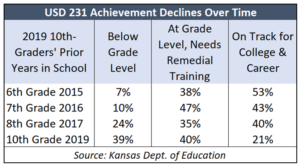Parents in the Gardner-Edgerton school district in Johnson County are being horribly misled about student achievement. The only question is whether the administration is misleading board members, who pass along bad information, or whether at least one board member knows he is spreading false information.
Board member John Brandon Parks last week responded to my comment sharing 2019 state assessment math results for Gardner-Edgerton high school students – 39% of 10th-grade students were below grade level, 40% were at grade level but needing remedial training to be on track for college and career, and just 21% were on track.

Parks first said he didn’t “see anything about being at grade level” in the state assessment descriptions. He went on to claim that “Level 2 indicates that students have the basic skills and knowledge for post-secondary success.”
Neither statement is true according to the Kansas Department of Education.
 This KSDE graphic defines Levels 2, 3, and 4 as being “at or above academic expectations for grade level.” Levels 3 and 4 are defined as “at or above expectations for college and career readiness.” Level 1 is below grade level.
This KSDE graphic defines Levels 2, 3, and 4 as being “at or above academic expectations for grade level.” Levels 3 and 4 are defined as “at or above expectations for college and career readiness.” Level 1 is below grade level.
The definitions clearly indicate that students in Level 2 are at grade level but are not on track for college and career. Those students need remedial training to be on track.
A school board member not understanding (or refuting) these definitions is a serious situation, and the Gardner-Edgerton district could be out of compliance with state law if Parks is repeating what he has been told by the district.
K.S.A. 72-1163 says, “Each year the board of education of a school district shall conduct an assessment of the educational needs of each attendance center in the district. Information obtained from such needs assessment shall be used by the board when preparing the budget of the school district.”
Parks and other school board members arguably could not have conducted a meaningful needs assessment of each attendance center if they have been led to believe that students in Level 2 are on track for college and career. We asked Superintendent Pam Stranathan if board members have been given accurate information; in this case, whether board members know that 39% of high school students are below grade level in math and only 21% are on track for college and career.
Stranathan would not respond to our email or phone call, which only increases the suspicion that Gardner-Edgerton is not complying with the building needs assessment law and/or consciously contributing to a false sense of high achievement in the district.
Students fall farther behind over time
Parks also wrongly believes the district can magically improve achievement for high school students, saying, “the HS test is given in 10th grade, so to imply that we are failing when there are 2 full years of education left to help students improve their knowledge and skillset is unfair and, frankly, disingenuous.”
 Contrary to Parks’ claim, the data shows no hope that achievement levels will improve in their last two years. The students who were in the 10th grade in 2019 were in the 6th grade in 2015. Then, only 7% of them were below grade level and 53% were on track for college and career. Their achievement deteriorated each year they were tested since then, with many more students falling below grade level and far fewer being on track.
Contrary to Parks’ claim, the data shows no hope that achievement levels will improve in their last two years. The students who were in the 10th grade in 2019 were in the 6th grade in 2015. Then, only 7% of them were below grade level and 53% were on track for college and career. Their achievement deteriorated each year they were tested since then, with many more students falling below grade level and far fewer being on track.
If district officials share these facts with school board members, they couldn’t responsibly tell parents that their children will miraculously do much better in their last two years of high school. But school board members should not blindly accept what they are told; they should be seeking the truth on their own.
This Gardner-Edgerton episode is yet another reminder that academically preparing students for college and career is not the #1 priority of most administrations and school boards. And that won’t change until legislators give them an incentive with money-follow-the-child parental choice legislation.



